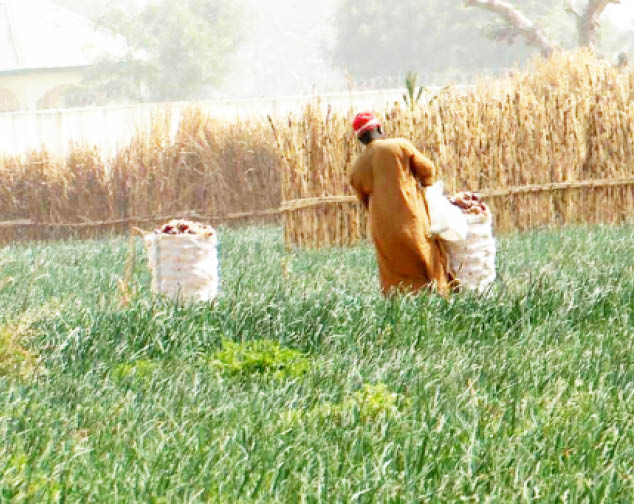Farmers lament as irrigation activities grounded
Farmers in the irrigation areas of Kano State have lamented over the scarcity and hike in the price of fuel and the scarcity of naira notes, which they said is threatening their hope of fruitful yields in this year’s dry season farming. The farmers, who were mostly from the southern part of Kano where irrigation […]

A vegetable farmer
Farmers in the irrigation areas of Kano State have lamented over the scarcity and hike in the price of fuel and the scarcity of naira notes, which they said is threatening their hope of fruitful yields in this year’s dry season farming.
The farmers, who were mostly from the southern part of Kano where irrigation thrives, said they face difficulties in getting money to buy fuel which delayed their watering of crops, hence affecting its possibilities of giving a significant birth.
According to many of them, who are mostly into wheat and vegetable farming, they have to join long queues for more than a day in filling stations where they are selling at official rate of between N180 and N200, while others that sell between N370 and N400 are costly and will affect their profit.
On the other hand, they said due to scarcity of the naira notes, sometimes they have to just watch as they have no money to buy the fuel even at high rates. They said if they have to continue with the expensive fuel, it will affect their profit or else render them to lose.
Speaking to Daily Trust about the situation, a wheat farmer in Bunkure Local Government Area, Abdurrahman Usman, said if the incident persists, some farmers may run at loss while others will get little or no profit.
“At a time when our farms are in dire need of water, the fuel is scarce and not only that; the money to buy the fuel is also difficult to get. Some filling stations find it difficult to collect transfers and in some few that use PoS, they experience network failure which is delaying our processes of farming.
“Apart from that, fuel is expensive now. If we insist on buying the cheaper one, my crop will be affected. That is why we have to purchase even from black markets. This is a serious problem and it will affect the farming sector,” he said.
Perishables marketers decry low patronage
Meanwhile, some vegetable farmers and processors have lamented as the new naira redesigned policy has affected them and put their business at the risk of collapsing if action is not taken.
The marketers in the popular Karfi perishables market located in Kura Local Government Area said they have been counting losses throughout the period and that it has affected them seriously with some of them leaving the market to something else.
On the other hand, the perishables farmers also revealed how the situation had plunged into a serious dilemma as regards transportation of the farm produce to the markets. Many of them said they don’t have bank accounts, and as small farmers, they need their payment in cash so as to easily buy commodities for their daily life but the policy couldn’t allow for that.
Speaking to our correspondent, one of the marketers, Alhaji Ammani Nuhu, said: “Since the beginning of the period, we have been managing the situation because this is the beginning of harvest of the perishables. While the produce is trooping to the market, people have no money at hand to purchase them. You already know how our perishables are; the more they stay, the more they decay.
“We have been counting our losses for many days now. Some people are already leaving the market, and if the situation persists, many people will lose their capitals,” he added.
Another big dealer, Shauibu Muhammad, said nowadays as the election approaches, coupled with hike in the price of diesel and scarcity of naira, they don’t take their goods to the southern parts as they sometimes run at loss. He said they now heavily rely on patronage from neighboring states and the metropolitan areas.
“We were already battling with the price of diesel which further affects the transportation of goods to other places. Now we are also battling with the price of diesel which adds some difficulties to the farm business. And now we are battling with low patronage as a result of naira scarcity. What do we do now? Everywhere is not easy for us,” he said.
Also speaking, a local marketer who sells perishables to households in Kano, Malam Audu Lawan, said people are no longer patronising them the way they used to do before the policy, which is why they have reduced patronising the bigger markets.
“People buy in pieces from us and they don’t have cash these days. The majority of people selling don’t have PoS machines or any other similar means, and that is why our patronage is declining. If we don’t sell here, how do you think the bigger markets can survive? It is not possible at all,” he said.
The marketers, alongside the farmers, urged the government and other stakeholders to look into their problems and rescue their sector from collapse, adding that thousands of people largely depend on them to earn a means of living and even more.
